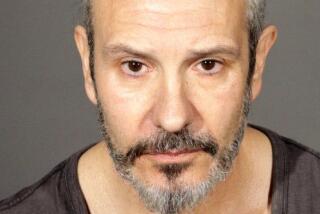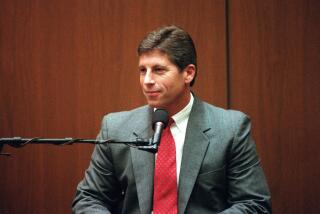Man Fined for Practicing Without License : Medicine: Investigation reveals that he continued to operate podiatry practice even though his residency had expired and he had failed state exam.
- Share via
A Huntington Beach man has been placed on three years’ probation and fined $250 after pleading no contest to a charge of operating a La Mirada podiatry practice without a license.
In exchange for the plea, prosecutors dropped four other related misdemeanor counts against 29-year-old Marc Howard Friedman in a pretrial proceeding Thursday at Downey Municipal Court.
Long Beach podiatrist Timothy James, who sold the La Mirada branch office of his practice to Friedman, still faces charges of aiding and abetting Friedman’s unlicensed practice.
The Board of Podiatry began looking into the case last September when it received a complaint that Friedman was practicing medicine without a license. State investigators said they found that Friedman was operating an office, advertising for customers, examining patients and writing prescriptions--even though he is unlicensed to practice podiatry in California. Friedman was arrested April 30.
James said he was not aware that Friedman was unlicensed, and said that he intends to plead not guilty at his Aug. 16 arraignment in Downey Municipal Court. The state Board of Podiatry will take no action against James’ license pending the outcome of criminal proceedings, officials said. James operates the Foot Care Centers Podiatry Group, which has offices in Norwalk and Long Beach.
To become licensed, a person must graduate from podiatry school, complete a one-year residency under a licensed podiatrist and pass oral and written tests.
Friedman had completed some of the requirements. He graduated from the Ohio College of Podiatric Medicine in May, 1988, and completed a one-year residency under James. He had failed at least one licensing exam, however, according to state records.
Residents are allowed to function as podiatrists under a doctor’s supervision, but must complete licensing tests in order to continue working past the expiration of their internship. Friedman’s residency, and thus his limited license to practice, ended Sept. 20, 1990. Without passing licensing tests, Friedman bought a portion of James’ practice and arranged to use the 39-year-old doctor’s logo, Board of Podiatry officials said.
“James introduced Friedman around,” said one undercover investigator, who asked that his name not be used. “One of the charges against James is that James allowed Friedman to assist him in surgery . . . while Friedman was unlicensed. And Friedman covered for James when he went on vacation.”
The attorney for James said that his client, a licensed podiatrist since 1977, had no reason to believe that Friedman had not received his license. “The whole world assumed that Friedman was licensed,” attorney P. Lee Johnson said. “When you complete your residency program and continue to function, the presumption is that you’re licensed.”
Friedman still hopes to become a licensed podiatrist, according to his attorney.
“He is a diligent and conscientious man, and he is trying to work within the rules and regulations of the profession and he was unaware that his residency had expired,” attorney Robert Shapiro said. “The guy is a graduate of a school of podiatry. It’s not like he has no training or ability in this field. He had been in a residency program and was working under a doctor. It wasn’t like he was endangering the public health and safety.”
The state Board of Podiatry has stepped up enforcement of licensing laws, said Jim Rathlesberger, executive officer.
“It became apparent that an attitude had developed among new practitioners that you really didn’t need a license,” he said. “The situation was dangerous enough that we had to enforce the law and communicate to the profession that you needed a license. There were some people that were not taking the law seriously.”
More to Read
Sign up for Essential California
The most important California stories and recommendations in your inbox every morning.
You may occasionally receive promotional content from the Los Angeles Times.














